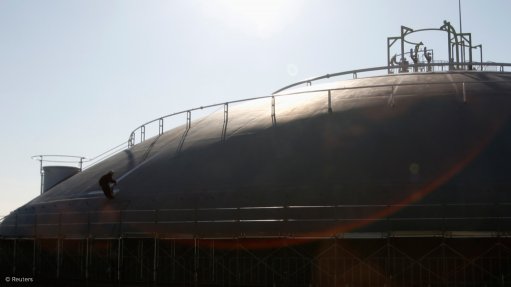
Photo by: reuters
Developing liquefied natural gas (LNG) facilities at the coastal village of Palma, in Mozambique, will likely facilitate a real gross domestic product (GDP) increase for the country of 800% by 2035, with the government receiving in excess of $200-billion in receipts over the life of a six-train facility, banking group Standard Bank claims.
Noting that LNG exploitation stood to transform the Southern African country, the bank said the development of provable reserves and the scaling-up of the currently planned LNG facility to its potentially multitrain capacity would establish Mozambique as one of the largest exporters of LNG.
“The opportunity scale, for developers, the government and citizens of Mozambique, as well as private participants across all sectors is, therefore, enormous,” it outlined in a statement this week.
US oil major Anadarko Petroleum, which had a 26.5% stake in the Area 1 licence in the offshore Rovuma Basin was currently developing the first two of up to ten LNG plants in Mozambique to liquefy gas for export.
Anadarko's partners include Mitsui, Oil India, Bharat PetroResources, PTT and Mozambique's State-run ENH.
Italian oil and gas company Eni had, meanwhile, made an offshore discovery that offered a mineral potential of about 2.5-trillion cubic metres of gas and was currently finalising gas contracts and production licences.
Standard Bank noted, however, that these world-scale discoveries would need large volumes of contracted LNG sales to underpin the sizeable offshore and onshore development requirements associated with monetising the gas.
“There is significant scope to provide gas to the local market to foster gas-based industrial development. This option has attracted interest from a number of players across power, fertiliser, petrochemicals and gas-to-liquids (GTL).
“As Mozambique develops into a global energy player, so too can it potentially become a regional energy hub providing petroleum products, chemicals and power to neighbouring countries. Regional LNG import options are developing at a rapid pace and Mozambique will also be well-positioned to serve these,” commented Standard Bank global oil & gas head Simon Ashby-Rudd.
Across the border, South Africa had recently announced the procurement of some 3 000 MW of gas-fired power, which would likely require LNG imports given that the country had no material gas-producing assets capable of supporting such plants.
Ashby-Rudd added that a final investment decision of Mozambique LNG would be a “game-changing development” for Mozambique and would be key to unlocking future investment in the country.
While moving gas from the Rovuma Basin to southern Mozambique was subject to its own economics and wider strategic consideration, there remained potential for gas-based development around Maputo through, for example, compressed natural gas or a dedicated pipeline.
“Such developments could facilitate industrial development around Maputo, as well as meet South Africa’s energy shortfall and generate additional revenue streams.
“These would, of course, be subject to other power, petrochemical and GTL developments further north and continued progress on the rolling out of further LNG trains over the next decade,” he averred.
While offering substantial potential, the Mozambiquan gas-based industry remained mired in uncertainty, as the development of an LNG facility near Palma had yet to be finalised and domestic gas sales agreements had yet to be concluded.
Further clarification was needed around the gas allocation mechanism to individual projects, as well as project permitting.
In addition, challenges specific to location, as well as global factors, such as the oil price, downstream market developments and regional developments, would impact on decision points as the domestic gas industries developed.
Resolving these outstanding items in the next 18 months would place Mozambique in a position to entrench itself in the energy landscape regionally, and do so well ahead of the 2019 national elections, said Ashby-Rudd.